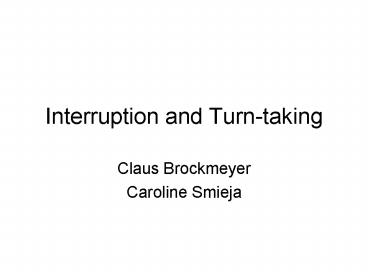Interruption and Turntaking - PowerPoint PPT Presentation
1 / 17
Title:
Interruption and Turntaking
Description:
The two components of the turn-taking model ... a deep intrusion & penetration of first speaker's utterance; 1. Interruption definition: ... – PowerPoint PPT presentation
Number of Views:81
Avg rating:3.0/5.0
Title: Interruption and Turntaking
1
Interruption and Turn-taking
- Claus Brockmeyer
- Caroline Smieja
2
Turn construction units (TCUs)
- TCUs are turns at talk, e.g. in sentences,
clauses, single words or phrases
3
The two components of the turn-taking model
- 1 TCUs have the property of projectability it
is possible for participants to project, in the
course of TCU, what sort of unit it is and at
what point it is likely to end. - 2 TCUs have transition-relevance places (TRPs)
at their boundaries at the end of each TCU there
is the possibility for legitimate transition
between speakers (example)
4
Interruptions - definition(West / Zimmermann
1975,1983)
- have the potential to disrupt a speakers turn
and disorganize ongoing construction of the
conversational topic of the first speaker - regarded as a hostile act
5
Interruptions - definition(West / Zimmermann
1975,1983)
- A second speaker begins speaking at what could
not be a TRP - a violation of the first speakers turn
- a device for exercising power and control in a
conversation - a deep intrusion penetration of first speakers
utterance
6
1. Interruption definition(Jennifer Coates)
- Violation of turn-taking rules of conversation.
The next speaker begins to speak while the
current speaker is still speaking, at a point in
the current speakers turn which could not be
defined as the last word.
7
2. Interruption definition(Jennifer Coates)
- Interruptions break the symmetry of the
conversational model the interruption prevents
the first speaker from finishing his/her turn, at
the same time gaining a turn for oneself (second
speaker).
8
Rules for Turn-taking(Sacks, Schegloff,
Jefferson, 1974)
- current speaker selects next speaker
- next speaker self-selects
- current speaker continues
9
Violation of the turn-taking model (Jennifer
Coates)
- grabbing the floor
- hogging the floor (taking the floor although
other speaker was selected) - not responding (silence)
10
Definitions of overlap
- Bennett (1981) Overlap is when two voices are
going on at the same time.
11
Definitions of overlap
- West / Zimmerman (1975/1983) An overlap is an
instance of simultaneous speech where a speaker
other than the current speaker begins to speak
at, or very close to a possible TRP in a current
speakers utterance. It is this proximity to a
legitimate point of speaker alternation that
leads to distinguish overlaps from interruptions.
12
Definitions of overlap
- Coates (2003) instances of slight
over-anticipation by the next speaker. - Over-anticipation does not necessarily force the
first speaker to finish his / her turn.
13
Interruption vs. Overlap (Tannen 1990)
- High-involvement style
- High-considerateness style
14
Interruption vs. Overlap (Tannen 1990)
- High-involvement style
- - little / no pause
- supportive tags (hms, yes, ok.)
- overlapping questions
- fast-paced latching (elaborating on a topic)
- conversation is not disrupted
- shows interest and rapport
15
Interruption vs. Overlap (Tannen 1990)
- High-considerateness style
- favour longer pauses
- averse to overlaps
- await TRP
- no sudden topic shifts
16
Conclusion
- different conversational styles
- subculture, culture, individual style and
predisposition - situation
- hierarchy / relationship of the speakers
17
- research is still going on.































